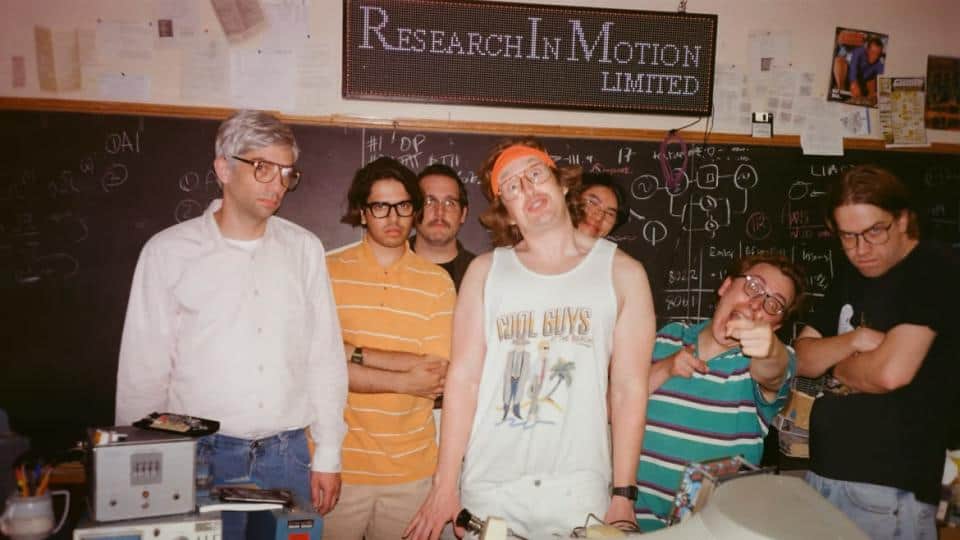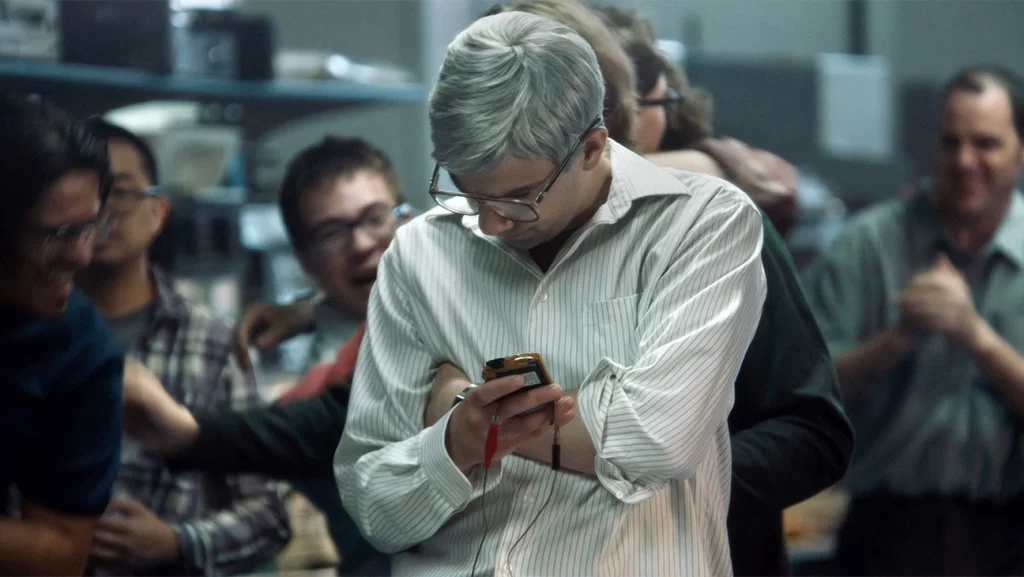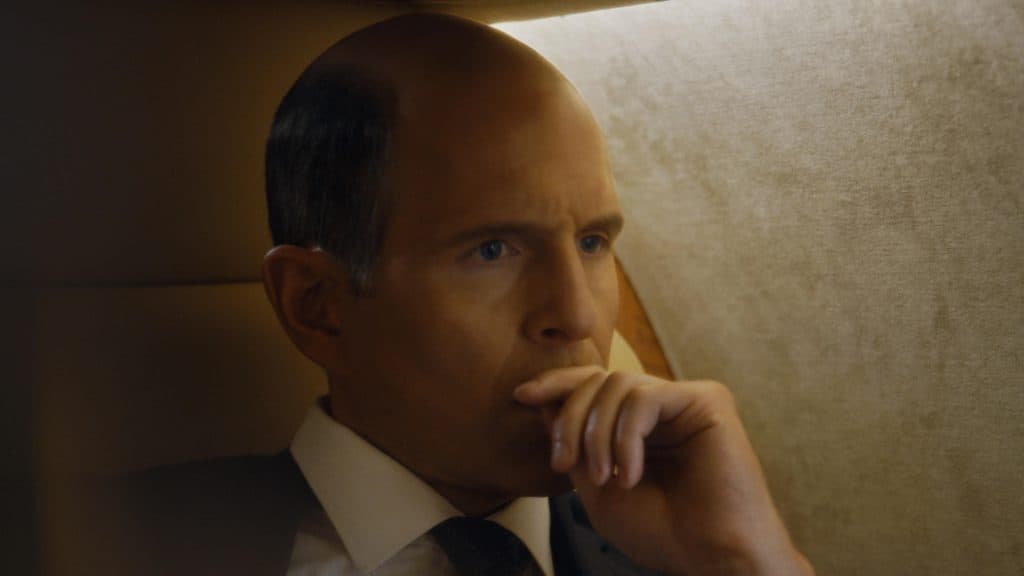We’ve gotten two films based on the life and times of Apple’s Steve Jobs, both of which, to varying capacities, talk about the iPhone. However, he didn’t actually invent smartphones. The real story of how we all became addicted to these ubiquitous pocket-sized time-sucks begins up north in Waterloo, Ontario, Canada. Mike Lazaridis, creator of the BlackBerry, would argue he invented the entire enterprise, yet his contribution and reputation have faded into obscurity…until now, kinda.
BlackBerry, Matt Johnson’s wildly entertaining take on the rise of the fall of the titular company, is far from a flattering portrait––nobody is gonna suddenly throw out their iPhone. However, it will submerge you into its history in a way you won’t soon forget. The Social Network by way of The Office by way of The Wolf of Wall Street, this cautionary tale in tech is already primed to be one of the year’s best.
Lazaridis (Jay Baruchel) and close friend Doug Fregin (Johnson himself) are co-founders of Research in Motion, a successful tech start-up. The film begins as they attempt to sell their latest innovation, the prototypical “PocketLink,” to corporate bigwig Jim Balsillie (Glenn Howerton). Their pitch flops, but Balsillie sees the potential in the idea and offers to become co-CEO and pitch their product for them.

Personalities instantly clash as no-nonsense Balsillie is unknowingly dropped into a world of LAN parties and emergency movie nights. However, his collaboration with Lazaridis, himself a quietly ambitious perfectionist, transformed the PocketLink into the BlackBerry. The phone becomes a worldwide sensation, but Balsillie and Lazaridis’ respective self-absorptions threaten the company and ultimately lead to its demise.
It’s a story we’ve seen before, but that is part of the fun. Johnson is clearly aware of the phone’s cultural reputation (at one point a character prophecies that the BlackBerry will become “the phone I had before I bought an iPhone”), so he knows that the key to this story is not just the journey, but the inevitability of the destination. It’s what makes gigantic on-screen personalities like Howerton and Johnson immediately compelling despite being very archetypical. Howerton is endlessly brash while still framed as an underdog, channeling an Always Sunny level of commitment to each and every interaction that makes it impossible not to root for him.
Meanwhile, Johnson is instantly likable as Fregin, a voice of reason who simply can’t survive a climate of machismo. Johnson’s comic timing is gangbusters in every moment, but it’s the sensitivity he brings to the darker moments that sell his embodiment in the role. For a good portion of the movie, it’s these two laugh-a-minute forces that stir the movie’s beautiful stylistic melting pot, as though Glengarry Glen Ross were directed by Please Don’t Destroy.
For a moment, you start to worry if Baruchel, an actor whose persona on film is typically insular, can compete with the presence of these two on-screen juggernauts. However, during a formative scene in which Lazaridis effectively sells the BlackBerry for the first time to a conference table of potential buyers, Baruchel finally breaks out into the center of his own movie.

Lazaridis asserts his technical dominance over an all-talk-and-no-walk Balsille just in the nick of time, throwing out beautifully crafted retorts from Johnson and co-writer Matthew Miller’s silver-tongued screenplay (“It’s the world’s biggest pager,” one buyer jokes, to which Lazaridis responds, “It’s actually the world’s smallest email terminal.”) Lazaridis’ journey from quiet co-founder to assertive and self-ascribed wonderkid is the soul of the film’s tragic fall from grace, and Baruchel inhabits it with expert restraint.
Another key to the film’s success is its visual style. It has a documentary feeling to it; tight, claustrophobic close-ups are captured with frenetic handheld––rack focusing and zoom-ins––but are often framed through windows or surrounded by walls or objects. There is a very specific and intentional artifice in the cinematography and framing that give certain shots far more dimensionality than if it were simply realistic.
As the film goes on, the style becomes more formal and the scope becomes grander. We go from capturing offices and conference rooms to airports and basketball stadiums. As the characters grow up, so too does the filmmaking. Some of the crazy fun is lost, but therein lies the point. As you watch the film’s brilliant but shattering final moments, you’re left sobered up from an exhilarating filmgoing experience. The only difference is that the characters themselves are left with regret, when audiences will be left with no such feeling.
BlackBerry had its North American Premiere at SXSW 2023 in the Narrative Spotlight section. The film is set to release later this year on a date to be determined, courtesy of IFC Films.
Director: Matt Johnson
Writer: Matt Johnson, Matthew Miller
Rated: NR
Runtime: 124m
'BlackBerry' feature an exception trio of performances, a laugh-a-minute screenplay, and a frenetic visual style that all coalesce into one of the best films of the year.
-
GVN Rating 9.5
-
User Ratings (0 Votes)
0

Larry Fried is a filmmaker, writer, and podcaster based in New Jersey. He is the host and creator of the podcast “My Favorite Movie is…,” a podcast dedicated to helping filmmakers make somebody’s next favorite movie. He is also the Visual Content Manager for Special Olympics New Jersey, an organization dedicated to competition and training opportunities for athletes with intellectual disabilities across the Garden State.







